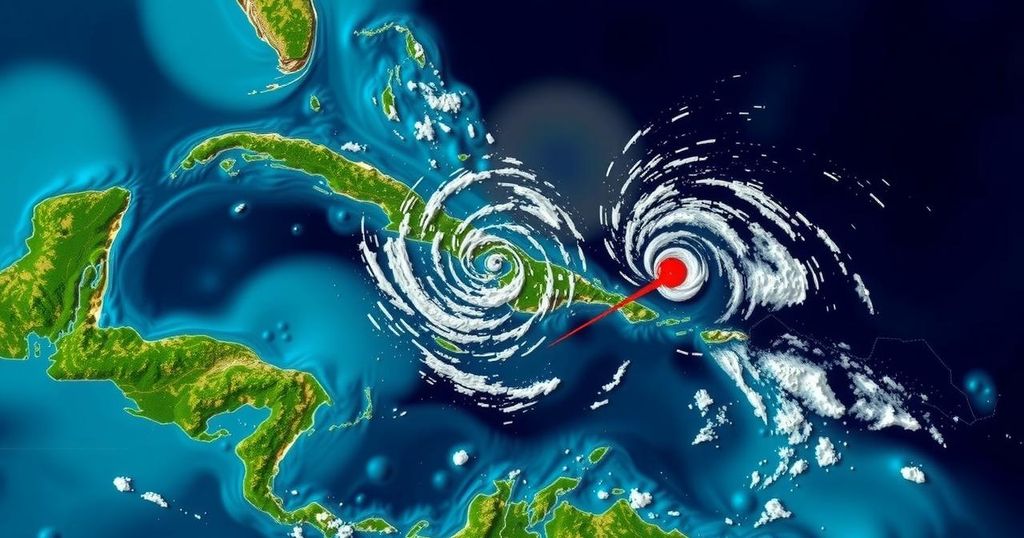Tropical Storm Oscar Approaches the Bahamas Following Hurricane Impact in Cuba

Tropical Storm Oscar is impacting the Bahamas after making landfall in Cuba as a Category 1 hurricane, resulting in at least six fatalities and heavy rainfall. The storm is moving north-northeast with winds of 40 mph and is expected to bring significant rainfall to the Bahamas. Oscar is noted for being the smallest recorded hurricane, leading to surprise among meteorologists regarding its strength. The article highlights the storm’s impact on Cuba amidst ongoing power outages and broader concerns for the Atlantic hurricane season.
Tropical Storm Oscar is progressing toward the Bahamas following its landfall in Cuba, where it had escalated to a Category 1 hurricane, resulting in at least six fatalities and extensive rainfall on a nation already grappling with a significant power outage. As of Tuesday morning, Oscar was positioned approximately 45 miles (75 kilometers) south-southeast of Long Island in the Bahamas, maintaining winds of 40 mph (65 kph) while advancing north-northeast at a rate of 12 mph (19 kph), as reported by the National Hurricane Center in Miami. Presently, the storm is described as barely qualifying as a tropical storm by meteorological assessments. The southeastern Bahamas is expected to experience rainfall accumulation of up to 5 inches (13 centimeters), with localized regions potentially receiving as much as 8 inches (20 centimeters). Consequently, a tropical storm warning remains in effect for the central and southeastern sections of the Bahamas. Historically, Oscar has notable distinctions, being recorded as the smallest hurricane, with a wind field of merely 6 miles (10 kilometers). Its landfall caught many unexpected, as it first struck Grand Inagua in the Bahamas on Saturday, followed by a second impact in eastern Cuba late Sunday. Michael Lowry, a hurricane specialist, remarked, “It is not often we see a colossal failure in hurricane forecasting,” pointing out that the models did not predict Oscar’s transition into a hurricane. In eastern Cuba, Oscar led to rainfall exceeding 15 inches (38 centimeters) on Monday, inciting grave concerns about flooding and potential landslides. The fatalities reported were specifically in the Guantánamo region. This hurricane struck Cuba at a time when the nation is still dealing with the repercussions of a massive blackout that ignited protests and prompted government warnings against civil unrest. Oscar is classified as the 15th named storm and the 10th hurricane of the Atlantic hurricane season, which commences on June 1 and concludes on November 30. The National Oceanic and Atmospheric Administration had earlier projected an above-average hurricane season this year, attributing it to record-warm ocean temperatures, forecasting between 17 and 25 named storms and anticipating the development of four to seven major hurricanes categorized as Category 3 or higher. Additionally, in the Pacific, Tropical Storm Kristy is presently situated over open waters, approximately 375 miles (605 kilometers) west-southwest of Acapulco, Mexico. Kristy is exhibiting maximum sustained winds of 50 mph (85 kph) and is moving west-northwest at a pace of 15 mph (24 kph), with expectations of it strengthening into a hurricane later today.
This article discusses the developments surrounding Tropical Storm Oscar, which transitioned from a hurricane after impacting Cuba and is now approaching the Bahamas. By detailing the storm’s path, the consequences it has had in terms of rainfall and fatalities, and its classification within the Atlantic hurricane season, the piece emphasizes the broader implications of tropical storms on local infrastructure and the challenges faced by meteorologists. The situation is aggravated by Cuba’s ongoing struggles with power outages and civil unrest, further highlighting the impact of natural disasters on vulnerable regions. Additionally, the article places Oscar within the context of known storm activity during the Atlantic hurricane season, illustrating its significance among other weather phenomena, such as Tropical Storm Kristy in the Pacific.
In summary, Tropical Storm Oscar has caused considerable devastation since making its landfall as a hurricane in Cuba, leading to fatalities and significant rainfall, while now advancing toward the Bahamas. This storm’s unique characteristics, such as being historically the smallest hurricane, alongside the broader implications of an active Atlantic hurricane season, underscore the growing challenges posed by climate-related events. As Cuba manages the fallout from both the storm and an existing power crisis, it exemplifies the compounded difficulties that nations face during such catastrophic events.
Original Source: apnews.com







